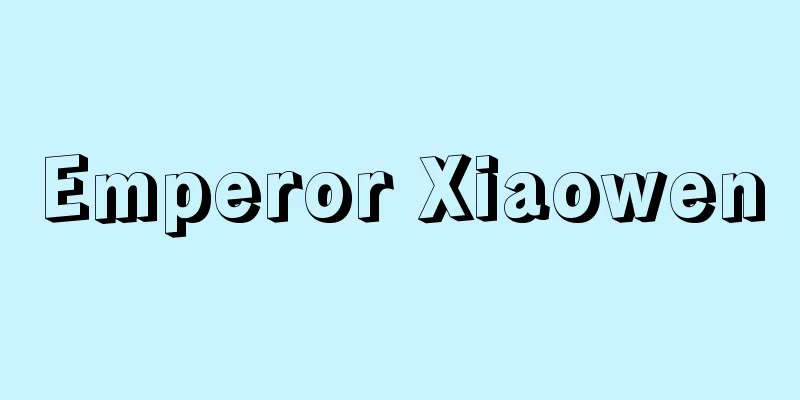Emperor Xiaowen

|
The 6th Emperor of the Northern Wei Dynasty of China (reigned 471-499). His given name was Hong and his temple name was Gaozu. He was 5 years old when he ascended to the throne after his father, Emperor Xianwen, abdicated, and his grandfather Emperor Wencheng's Empress Dowager Wencheng ruled until 490. During this time, the equal-field system, which was supposed to be a state control of land, the tax collection system, which collected taxes on couples instead of households, and the three-head system, which created the conditions for the implementation of these systems, were created. These aimed to give the state direct control over small peasants, and are of great significance not only in the Northern Wei Dynasty but also in Chinese history. The implementation of the salary payment system for local officials that preceded this can also be seen as part of this. The policies of the direct rule period built on this foundation are usually called the Hanification policy. It began with the forced transfer of the capital from Pingcheng (Datong, Shanxi Province) to Luoyang (beginning in 493), followed by a series of measures such as banning the use of Xianbei language and clothing, changing surnames to Han Chinese style (for example, the imperial family's Tuoba clan became Yuan), and not allowing northerners who had moved to Luoyang to return to Pingcheng for burial. The most notable was the classification of surnames, which, along with the detailed classification of the family status of Han aristocrats, attempted to reorganize northern society under the clan system that defined Chinese society at the time, and on top of that, encouraged intermarriage between Han people of equal status and northerners, and the emperor himself chose women from noble Han families as wives for his younger brothers. These were measures to break the deadlock in the rule of the Northern tribes, but on the other hand, they caused great dissatisfaction among them, and during his reign the crown prince and others rebelled, and they were the indirect cause of the Six Garrison Rebellion twenty years later. The emperor was so well educated in Chinese that he even wrote imperial edicts himself, and many of the court ceremonies were changed to Chinese ones during his reign. [Keifumi Kubozoe] Source: Shogakukan Encyclopedia Nipponica About Encyclopedia Nipponica Information | Legend |
|
中国、北魏(ほくぎ)第6代の皇帝(在位471~499)。諱(いみな)は宏、廟号(びょうごう)は高祖。父献文帝の譲位により即位したときは5歳であり、祖父文成帝の皇后文明太后の執政が490年まで続いた。この間に、国家による土地把握をたてまえとする均田制、戸単位にかわって夫婦を単位として徴税する租調制、それらを施行する条件をつくる三長(さんちょう)制の創出が行われた。これらは国家による小農民の直接把握を目ざすもので、北魏のみならず中国史上重要な意義をもつ。これに先だつ地方官への俸禄(ほうろく)支給制の施行もその一環とみなせる。 この基礎のうえに立つ親政期の政策は、通常、漢化政策と称される。それは平城(へいじょう)(山西省大同)から洛陽(らくよう)への遷都強行に始まり(493年に着手)、鮮卑(せんぴ)の言語、衣服の使用を禁じ、姓を漢族風に改め(たとえば帝室拓跋(たくばつ)氏は元氏となった)、洛陽に移った北人の平城帰葬を許さないなどの諸策が相次いで出された。もっとも注目すべきは姓族分定であり、漢人貴族の家格詳定を伴いつつ、北族社会を、当時の中国社会を規定していた門閥(もんばつ)主義下に再編しようとしたものであり、そのうえで同格の漢人と北族の通婚を奨励、帝は自ら諸弟の妃に漢人名族の女を選んだ。これらは北族による統治の行き詰まりの打開策であったが、反面、北族の不満は大きく、在世中に皇太子らの反逆があり、また20余年後の六鎮(りくちん)の乱の遠因となった。帝は、詔勅をも自ら書くほど中国的教養が深く、朝廷の儀礼も、治世中に多く中国的なそれに改められた。 [窪添慶文] 出典 小学館 日本大百科全書(ニッポニカ)日本大百科全書(ニッポニカ)について 情報 | 凡例 |
>>: Gao Wen-jin (English spelling)
Recommend
materialistische Anschauung der Geschichte
…As can be seen from this example, opinions are d...
WPW syndrome
In 1930, three researchers described a distinctiv...
Chulalongkorn
King of Thailand (reigned 1868-1910). Rama V. Know...
Bellman, R.
…It is also called dynamic programming. There are...
Eagle - Eagle
A general term for large species of birds in the f...
Direct product
Recently, it is often simply called the product. (...
Kunyozushiki - Konyozushiki
The most outstanding world geography book from the...
Alto drums
…The size of the membrane is slightly larger than...
Illustrated Sutra of Cause and Effect
This is a pictorial explanation of the "Kako...
Cell differentiation
During the process of individual development, spec...
Catiline
…After that, he devoted himself to historical wri...
Shamm al-nasīm (English spelling) Shammalnasim
…In Iran, in addition to the Gregorian and Hijri ...
Computer output microfilm - computer output microfilm
Also called COM for short. A system in which micro...
Ahirbudniya Samhita - Ahirbudniya Samhita
...Although the process of its establishment is n...
beat
A lifestyle movement that arose in the 1950s, main...









